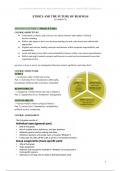uva msc business administration: digital marketing track | semester I - period I (2023-2024) [by gycc]
ETHICS AND THE FUTURE OF BUSINESS
[6314M0507Y]
2023.09.05 | LECTURE 1 | Morals & Ethics
COURSE OBJECTIVES
● Understand, evaluate, and criticise core ethical theories and models of ethical
decision-making
● Reflect and improve their own decision-making towards value-based and stakeholder
approaches
● Explain and criticise leading concepts and theories within corporate responsibility and
sustainability
● Learn and analyse key ethics and sustainability themes within your chosen specialisation
● Reflect and apply learned concepts and theories to social and environmental issues that
organisations face
question to keep in mind: are management theories amoral, apolitical, and value-free?
COURSE STRUCTURE
ETHICS
→ systematic study of right and wrong
Part 1 | individual level | foundations: philosophy,
psychology, (behavioural) economics, leadership
RESPONSIBILITY
→ integration of triple bottom line into companies
Part 2 | organisation level | foundation: management
SUSTAINABILITY
→ human welfare within ecological balance
Part 3 | society level | foundations: sustainability,
political science, complexity
COURSE ASSESSMENT
1
, uva msc business administration: digital marketing track | semester I - period I (2023-2024) [by gycc]
INTRODUCTION TO BUSINESS ETHICS
● MORALITY → humans’ ability to distinguish between right and wrong
● ETHICS → the systematic study of morality
● ETHICAL THEORIES → principles and rules that determine right and wrong in different
situations
● Normative ethics → the study of how we ought to behave
ETHICS: an on-going discussion about morality with a very long history; typically examines right
and wrong from the perspective of a human being (anthropocentric), instead of, e.g. nature
● Key questions
○ What kind of moral principles should guide our actions?
○ What kind of outcomes should we aim for?
● Ethics is not just theorization of morals, but the aim is also to affect practice
● Ethical theories can give contradictory solutions to the same problem
● Business ethics → the study of business situations, activities, and decisions where issues of
right and wrong are addressed
● Do we need ethics when we have the law?
○ In society, morality is the foundation of the law
○ Law and ethics are also partly overlapping
○ However,
■ The law does not cover all ethical issues (e.g. cheating)
■ Not all problems are legal situations and not all legal issues are ethical (e.g.
driving on the right side of the road - it’s legal)
■ Law and ethics can involve contradictions (e.g. apartheid); regularly, laws
could be unethical
○ The road from unethical to illegal is short and slippery
○ Companies can operate in locations with lacking legal infrastructure
TROLLEY PROBLEM: an ethical experiment that illustrates the dilemma of sacrificing one person
to save five (context: a trolley has a defect and has two roads to choose from, the one it was following
but kills five people, or sidetrack to another path and kill one worker)
● Forces us to think/choose when there are no good choices
● Most people apply a utilitarianism view; choosing based on the greater good
● In ethical dilemmas, people don’t think logically but depend their choices on factors / context
● The choices made are related to emotional aversion (the type and amount of emotional
feelings you assert for a certain factor, e.g. kids and females)
2
, uva msc business administration: digital marketing track | semester I - period I (2023-2024) [by gycc]
NORMATIVE ETHICAL THEORIES
Various theories / perspectives
1) ETHICAL EGOISM
● Not considered as an ethical theory, more a perspective
● This view is very foundational in economics: focusing on self-interest, rational thinking
● An action is morally right if the decision-maker freely decides in order to pursue either
their (short-term) desires or their (long-term) interests <= what’s in it for me?
● Authors
○ Thomas Hobbes
○ Adam Smith
○ Ayn Rand
● The influence of egoism is related to the perception of ideal markets and Adam Smith’s
‘invisible hand’: “It is not from the benevolence of the butcher, the brewer, or the baker that
we expect our dinner, but from their regard to their own interest” (1776)
● Problems
○ Inconsistent => it condones immoral wrongs, even if its violence / theft, or against
the vulnerable, as long as the egoist’s needs are served
○ Self-conflicting => you cannot always act upon self-interest and personal desires
○ A moral view based on short term satisfaction of needs is contradictory with our own
moral principles
○ Enlightened egoism → focuses on the meeting of long-term human interests
○ It also does not take a stance on the nature of the interests and desires of individuals,
which can still lead to problems due to conflicting interests
○ Although taking care of your needs and interest is morally important, theory needs to
be complemented by more developed ethical theories
● Application to moral machine: self-driving car
○ Ethical egoist decision: protecting those they love, protect themselves first and that
they care about
○ If an ethical egoist is buying a car, she/he would protect the people inside the car
○ If an ethical egoist is manufacturing the car, she/he would likely aim to serve egoist
customers to sell more cars
3






